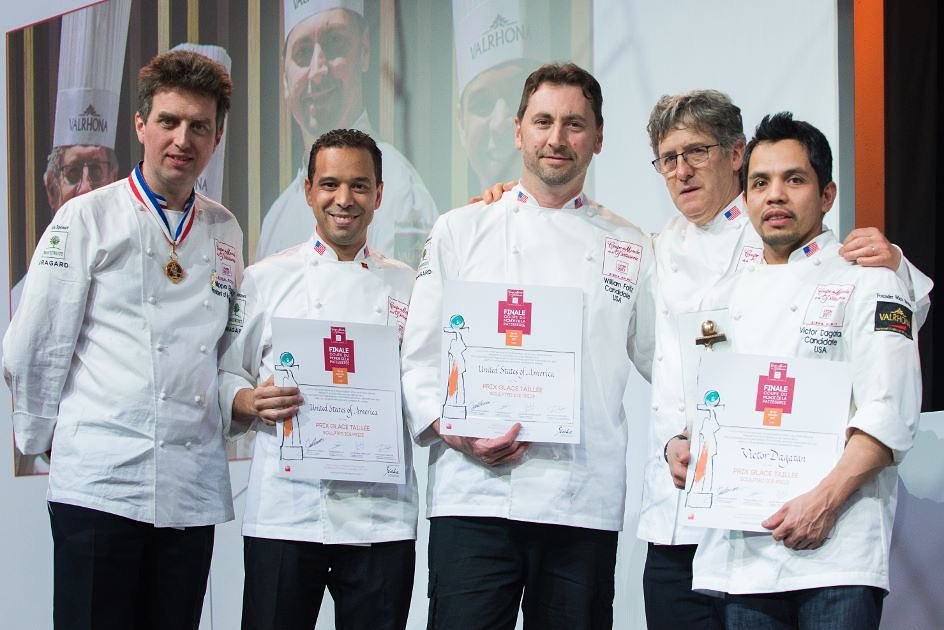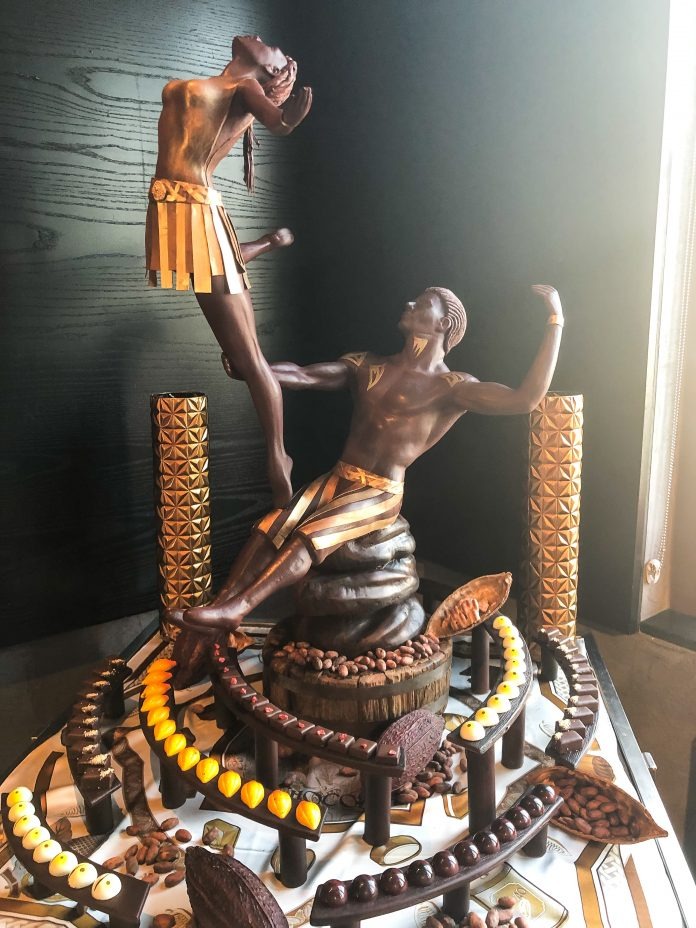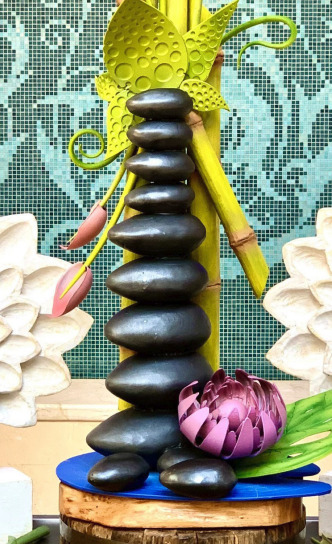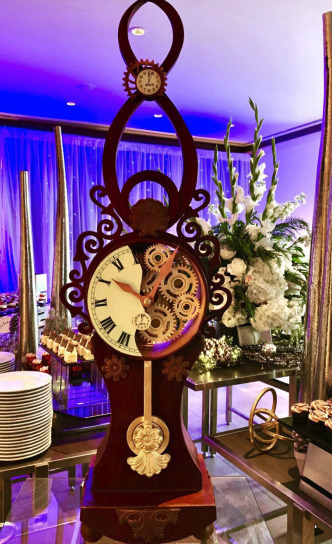As part of our ongoing “Meet the Chef” series, we are delighted to present Chef Rabii Saber, the Executive Pastry Chef at the Four Seasons Resort Orlando at Walt Disney World. Chef Saber was a valuable member of Club Coupe du Monde Team USA in 2017, alongside Chefs Bill Foltz, Victor Dagatan, and Robert Nieto. The team was coached by Chefs Roy Pell and Christophe Feyt. Rabii was the Chocolate Candidate for the 2017 team.

Gilles Renusson (Chairman), and Victor Dagatan
The team won several awards at the 2017 Coupe du Monde de la Pâtisserie in Lyon, France including Best Chocolate Cake, Best Ice Sculpture, and Most Eco-Responsible Team.
Hailing from Meknes, Morocco, Rabii discovered his passion for cooking and pastries through assisting his mother in crafting sweet delicacies. Despite societal norms that didn’t traditionally place men in the kitchen, Rabii found joy in the late-night sessions where his mother prepared sweets, often using ingredients like honey and almonds for the next day’s holiday celebrations. Undeterred by conventions, Rabii continued to embrace his love for culinary pursuits and remained a dedicated helper in his mother’s kitchen.
At the age of 18, he enrolled in the Hostelry Technique in Culinary Arts from ITHT in Morocco. During an apprenticeship, Rabii decided to focus on pastries. He started his pastry career working for some of the top hotels and restaurants in the world including the Hotel Sofitel Diwan, Greenbrier Hotel and Resort in White Sulphur Springs, West Virginia, and the Bellagio Resort in Las Vegas, Nevada.

Before joining the Four Seasons Resort Orlando at Walt Disney World, Rabii was the Executive Pastry Chef a the Four Seasons Resort Lanai, Hawaii.

This past Christmas, Rabii paid homage to his heritage with a magnificent display of Moroccan-inspired chocolate nutcrackers at the resort. Included were Zellij authentic Moroccan tile design and couture marocaine, or Moroccan sewing (caftan/kaftan style dress). He said it was an “homage to all Moroccan artisans that maintain the Moroccan heritage alive.”


“The world of sweets is for everybody. No matter your taste, you can always find something on the dessert menu that will make you happy.”
Chef Rabii Saber





The following is an interview Rabii did with “Pastry Arts Magazine” for the June 2022 issue.
Rabii Saber established a passion for the kitchen at an early age. Growing up in Morocco, Saber would cook alongside his mother preparing family meals, and later his sister to make cookies and cakes for various occasions. By 18 years of age, he decided to pursue a career in food by enrolling in culinary school. Back then, that career path had uncertainties, which led to varied levels of support from his family. Yet, Saber chose with sheer determination to make it work. During his culinary school apprenticeship, at a well-known pastry shop in Casablanca, Saber zeroed in on pastry at his niche in food. After a slew of career victories and industry accolades post-graduation, Saber is now the Executive Pastry Chef at the Four Seasons Resort in Orlando, Florida. As a Five Diamond-rated hotel, the property is one of the best in the country, and Saber is responsible for overseeing pastry and bakery production in the six restaurants and banquet space. And despite his schedule, Saber took time to speak with us about his career progression, what it takes to achieve success in pastry, and offer some technical tips.
What drove you to a career in pastry?
I was always interested in the kitchen in general. Back in the day, I helped my mom prepare family meals. At a certain point, I started working with my sister to make cookies or birthday cakes for family or us, just having fun. After that, I started making them for friends, and the network started growing and growing. When I was 18, I just decided to go to culinary school. And I was very, very determined. Back then, I had some pushback from family member because no one knew about how successful I could be, especially in Morocco. But I was so determined. I didn’t listen to any comments or anything, I just went to school, and it started there.
Was there a defining period early in your career?
When I went to culinary school, the first year was hospitality – front of the house, restaurants, concierge, hotel reception, etc. We touched every single aspect of hotel operations. During that time, I did an apprenticeship at one of the best pastry shops in Casablanca. We catered to high profile guests at VIP events, and it was very eye opening. Then, for my second year, I trained in culinary, but I was more determined to do pastry because of that apprenticeship. So during my second year, I helped a teacher (turned mentor) in pastry. I shadowed him all of the time. He gave me a magazine with beautiful cakes and sculptures – I still have that magazine to this day in my office – and I was so curious to learn how to do that. This was a defining point for me.
Speaking of mentors, was there someone who inspired you early on?
There was a seven-day training I did with Vincent Mary, who was from Ecole Lenôtre in Paris. I was the only attendee, because it was during a holiday season. I worked with him one-on-one, and he wrote something for me in one of my notebooks afterward. He said, “A brilliant pastry chef with a brilliant future.” Coming from someone who came from Ecole Lenôtre, who was very good at what he does, it was very motivating to me, and it helped me to keep striving for perfection.
Looking at what’s happening now in the current pastry field, I believe you have to make certain sacrifices. The main sacrifice is you need to let go of your ego.
On that last point of striving for perfection, for pastry professionals working to elevate their careers today, what advice do you have?
Looking at what’s happening now in the current pastry field, I believe you have to make certain sacrifices. The main sacrifice is you need to let go of your ego. Believing in yourself is good, but let the ego go. And if you strive to work somewhere good, don’t look only for title or pay, look for what you’re going to achieve as far as skills or experience. Something that will help you down the road in future jobs. I think most of the young generation, they’re more looking to title or pay, and they lose the opportunity to look for what they’re going to learn as far as skills go. Also, you need to be patient and dedicated. Pastry is a craft. It’s something that you do with your hands. You need to master it. To do that, you need to practice. And with that practice is going to come perfection.
In your opinion, what’s the most underrated skill required to achieve notable success in the pastry industry today?
Learning and dominating the basic recipes. It’s more accessible to buy mixes or pie shells, certain laminated doughs or breakfast pastries, however, you should learn and master those basic and classic recipes. That will make you succeed. Those are the foundations of pastry. Dig in to learn the science behind them. The foundation needs to be very, very solid. Once you dominate those, the rest is going to be easy, because it’s just combinations of all those recipes. I think these basics are something that’s missed today. People are looking at the final product, which is appealing, but they don’t know the foundation.
If you strive to work somewhere good, don’t look only for title or pay, look for what you’re going to achieve as far as skills or experience. Something that will help you down the road in future jobs.
Changing gears, what is something you personally enjoy making?
I enjoy making plated desserts. The reason is because you’re combining multiple elements to give an experience on the plate. Because when you make, let’s say, an individual pastry, you’re only making an individual pastry. But with a plated dessert, you can add a twist or certain details that enhance the look, but at the same time give the dessert another level when it comes to taste. And because you can add elements of cold, refreshing, crunchy texture or creaminess, that is all fun for me.
Any tips or best practices in relation to making plated desserts?
When it comes to flavor, don’t go too crazy. Don’t mix up seven flavors because you can get lost. You’re not going to determine the dominant flavor. Keep it straightforward with three to four flavors. And then keep it interesting when it comes to texture. For me, texture is very, very important. And it needs to taste as beautiful as it looks. Because, yes, the eye is first, because it’s very appealing, however, when it’s tasted, it needs really to match the visual appeal.
When it comes to plating, I always try to keep the dessert more centralized, because the eye has its focal points, and the dessert needs to be without those parameters. Because if you plate a dessert and then place another component too far from it, it’s a little bit distracting to the eye. I remember back in the day during my training, one of the chefs taught me that the edge of the plate should be kept clean. Basically keep your food inside the plate, but don’t touch the side of the plate.
Pastry is a craft. It’s something that you do with your hands. You need to master it. To do that, you need to practice. And with that practice is going to come perfection.
Is there a particular technique that you enjoy using in any of your desserts?
I use multiple techniques, however, something that would distinguish me is that I like to build my desserts in layers. And I use this for plated desserts, as well.
Are there any flavor combinations you’re currently using or exploring?
If I work with chocolate, I have a large selection. I use mostly Valrhona, and I have basically almost all the collection. When I use fruits, I always prefer to use fresh fruits. However, if I don’t find a nice ripe fruit, I will use eventually purée. For flavors, it depends on what the dessert is going to be for. When I work with chocolate, I need to taste the chocolate first to see how I’m going to combine that chocolate with another flavor. Overall, I don’t use too many flavors. Even in the desserts that have all the accent components, those accents are not going to touch the flavor.
Can you give a brief synopsis of your role as Executive Pastry Chef at the Four Seasons resort?
First, the Four Seasons is the only five-diamond resort in Central Florida, and it’s the number one best hotel in Florida, according to U.S. News. Our operation consists of 443 rooms and six restaurants, plus the banquet space. Our operation is very, very diverse. My role is to ensure all pastry and bakery products are done in the highest quality possible to cater to all those outlets.
When it comes to pastry, however, my job is not only ensuring the quality, but also managing the team. Our team consists of over 20 people that help with the operation. The managerial aspect of the operation is becoming more and more important in our field, because you need to ensure you are meeting targets when it comes to budgets, food cost and labor. You need to be very, very efficient. And you need to keep the team motivated, focused, delivering and willing to come to work happy with a big smile on a daily basis. That is one of the things I enjoy doing naturally.
When it comes to plating, I always try to keep the dessert more centralized, because the eye has its focal points, and the dessert needs to be without those parameters.
Regarding your team, are there certain things you have in place to foster a great working environment?
Most importantly, you have to build trust. If you build trust, the team is going to do their very best. That is important and very fundamental. You also need to be able to listen. We all have our challenges in or outside of work. You have to be there as a leader, you need to listen to their concerns, and not only listen, but see how you can help. You need to be able to support the team.
If there is trust and if you listen to the team, you can overcome any challenge, even during COVID. We had a very, very tough situation. However, we stand together and I’m very proud that the entire team came back from COVID. They all remain here. We didn’t lose one single team member, and I’m very happy and proud of that.
Rabii can be followed on Instagram and Facebook.
Image: Chef Rabii Saber





